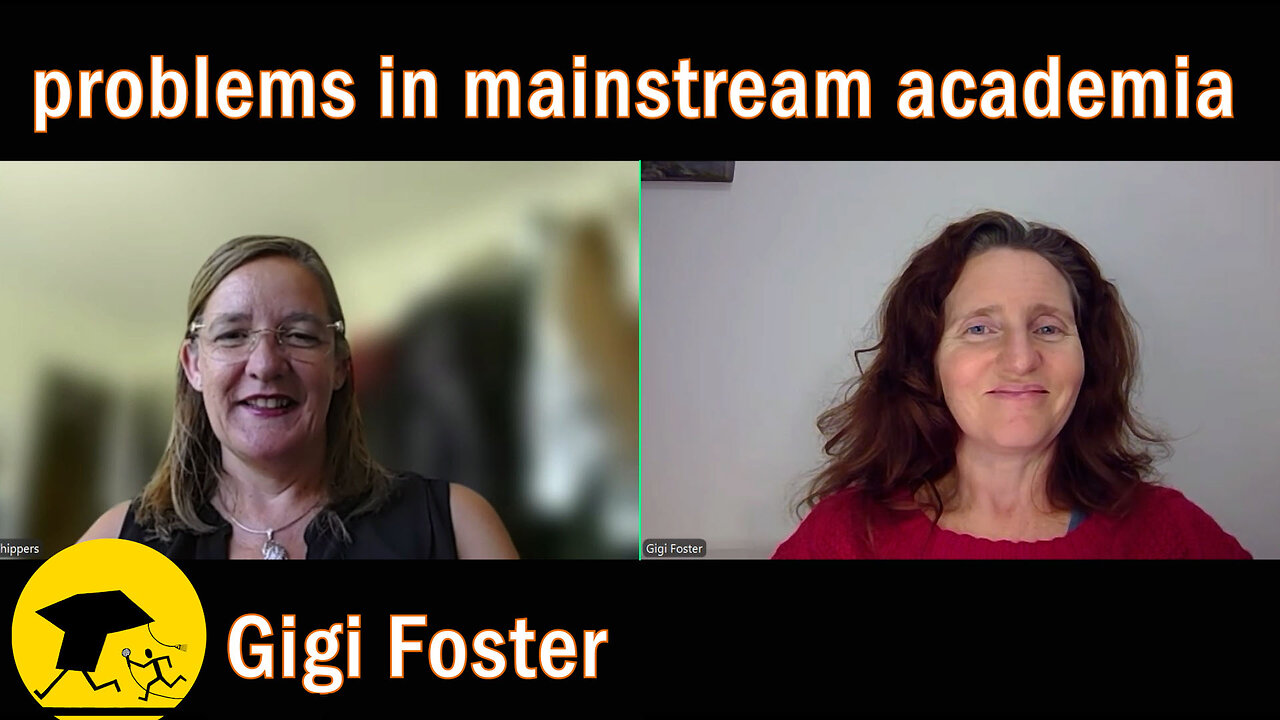Premium Only Content

Problems in Mainstream Academia - Gigi Foster
This conversation critically examines the modern misuse of language, particularly the appropriation of moral virtues such as compassion, environmental care, and inclusivity, to justify ideologically driven agendas. Gigi Foster (professor of economics at the University of New South Wales, Sydney Australia) argues that certain values—once universally respected—are being weaponized in a manner akin to “Trojan horses”: they retain their positive connotations while being used to promote policies and ideas that, in practice, can be misleading, coercive, or harmful.
A key example is the invocation of environmental concern. The speaker highlights how the phrase “caring for the Earth,” though genuinely meaningful to most people, is often co-opted to justify extreme or “anti-human” policies—specifically referencing “net zero” climate mandates. While the speaker affirms a genuine commitment to environmental stewardship, they reject the way this virtue has been bundled with restrictive or damaging political measures. The point is not to deny climate change or the need for responsible policy, but to resist uncritically accepting radical solutions simply because they are branded with virtuous language.
This misuse of language, the speaker argues, leads to a kind of moral confusion. People are pressured to conform to ideological agendas because resisting them appears to mean opposing compassion, justice, or care. The speaker challenges this false dichotomy, asserting that it is entirely possible—and necessary—to uphold core values while opposing the ways they are being distorted for political purposes.
The conversation further explores how modern discourse encourages collective labeling and identity-based politics at the expense of individual freedom and shared humanity. The speaker notes that this trend toward categorization and ideological tribalism often divides rather than unites, creating a culture of compliance where critical voices are dismissed or demonized.
There is particular concern with the influence of institutions—governments, educational systems, corporations, and media—that reinforce these distortions. These institutions often promote particular narratives under the guise of moral or scientific authority, making dissent appear illegitimate or harmful. This environment fosters intellectual authoritarianism, where questioning dominant ideas, even thoughtfully and respectfully, is treated as a social or ethical transgression.
Despite these critiques, the speaker maintains an optimistic and constructive tone. They advocate for a cultural reclamation of virtues—urging people to reassert ownership of values like truth, love, responsibility, and care, free from ideological manipulation. The idea is not to reject modern ideals altogether, but to disentangle them from the dogmatic and coercive methods now associated with them.
The speaker insists that reclaiming these virtues does not mean moving backward or abandoning progress; rather, it means ensuring that the ideals themselves are not corrupted by political expediency or cultural pressure. For instance, one can support environmental protection without endorsing authoritarian climate mandates, or support diversity without endorsing speech control or compelled ideology.
In emphasizing this distinction, the speaker warns against what they describe as “virtue packaging”—where desirable terms are bundled with unrelated, often radical policies. This tactic relies on people’s natural desire to do good, exploiting their good intentions to secure support for agendas they might otherwise oppose if presented plainly.
The speaker references personal experiences, including giving a TEDx talk, to illustrate how these themes play out in real-world settings. They encourage listeners to be brave, thoughtful, and articulate in their values, even when it means challenging dominant narratives. Courage and clarity, they argue, are crucial in an age where moral language is often used to manipulate rather than illuminate.
Ultimately, the conversation is a call to intellectual and moral sovereignty. It urges individuals to think critically, speak honestly, and remain anchored in authentic values rather than ideological trends. It encourages compassion that is grounded in truth, not slogans. And it promotes the idea that virtue must be protected—not only from neglect but also from exploitation.
The speaker concludes with a hopeful outlook: that more people are beginning to notice the gap between rhetoric and reality, and that reclaiming language and values is not only possible but necessary. The path forward, they argue, is not through cynicism or reactionary resistance, but through courageous honesty, moral clarity, and deep respect for human dignity and freedom.
-
 LIVE
LIVE
Due Dissidence
10 hours agoTrump GOES NUCLEAR on MTG, Tucker Exposes Butler COVERUP, Shmuley SUED For HILARIOUS Reason
1,349 watching -
 20:13
20:13
RealReaper
4 hours agoPredator Badlands: If You Like This Movie Then I Hate You
695 -
 LIVE
LIVE
GritsGG
3 hours ago#1 Most Warzone Wins 4000+!
118 watching -
 41:54
41:54
Nicholas Bowling
4 hours agoWhile Preaching to Muslims, EX-MUSLIM Shares Why He Left Islam (London, UK)
39 -
 LIVE
LIVE
bucketofish
1 hour agoNoise Floor \\ Behind the Mix - Ep 002 - Wide Awake by Katy Perry
92 watching -
 LIVE
LIVE
Biscotti-B23
1 hour ago $0.11 earned🔴 LIVE DISPATCH PLAYTHROUGH & PARTY GAMES
167 watching -
 LIVE
LIVE
Lofi Girl
2 years agoSynthwave Radio 🌌 - beats to chill/game to
90 watching -
 3:23:11
3:23:11
LumpyPotatoX2
3 hours agoHostile Takeover | High-Stakes PvP - #RumbleGaming
11.5K3 -
 2:07:50
2:07:50
LadyDesireeMusic
3 hours ago $20.92 earnedCooking Stream | Make Ladies Great Again
45.4K5 -
 2:03:42
2:03:42
The Connect: With Johnny Mitchell
1 day ago $29.77 earnedAmerican Vigilante Reveals How He Went To WAR Against The WORST Cartels In Mexico
118K14